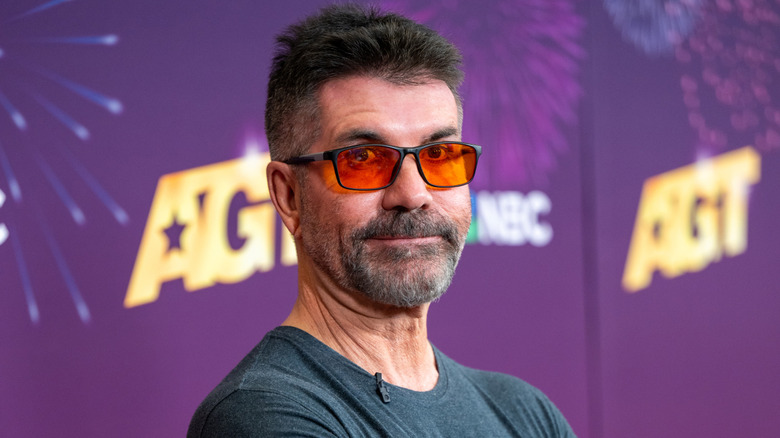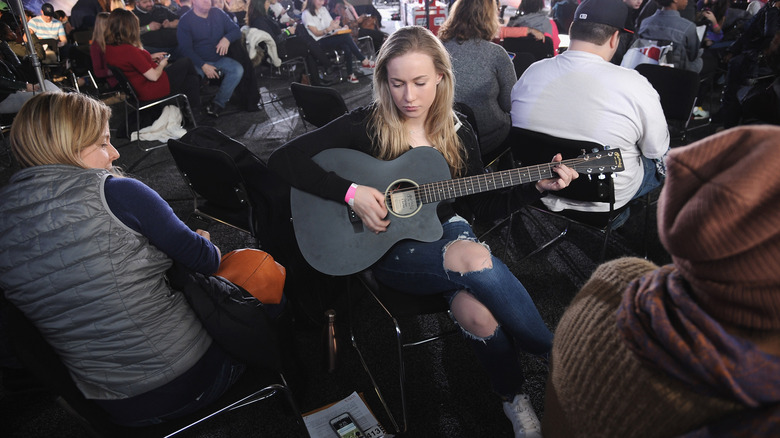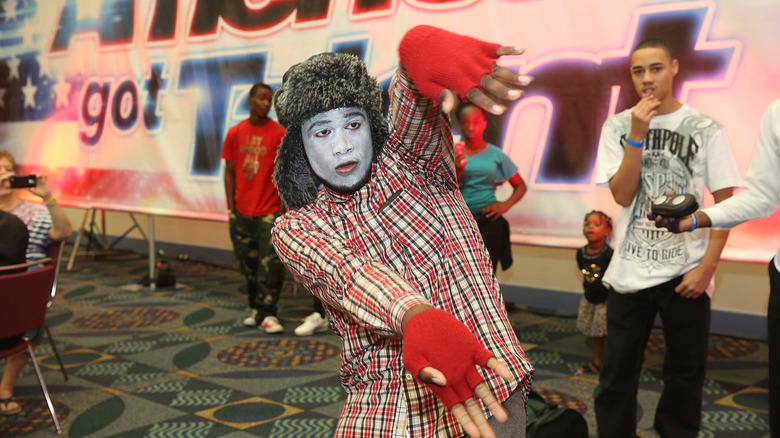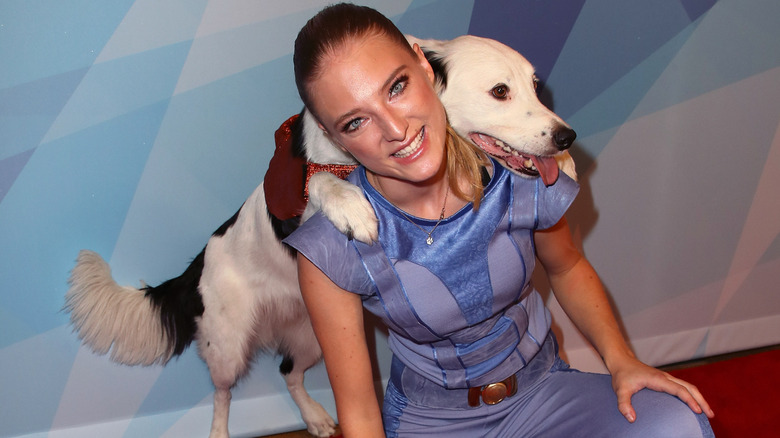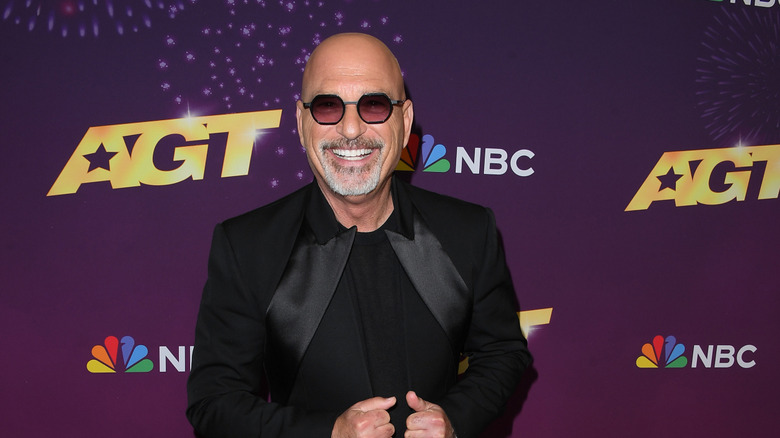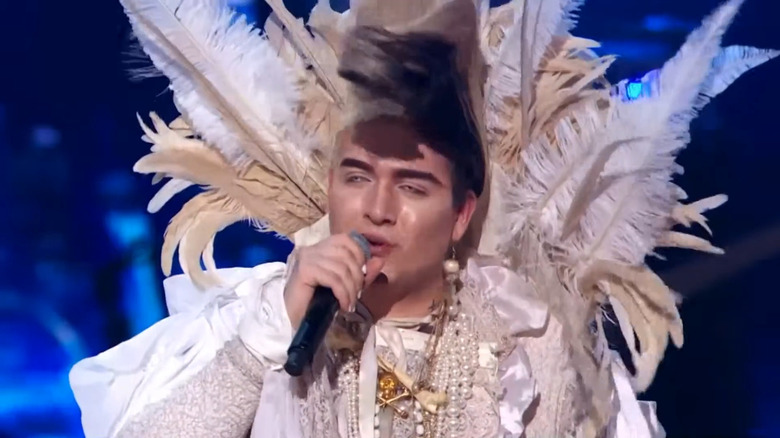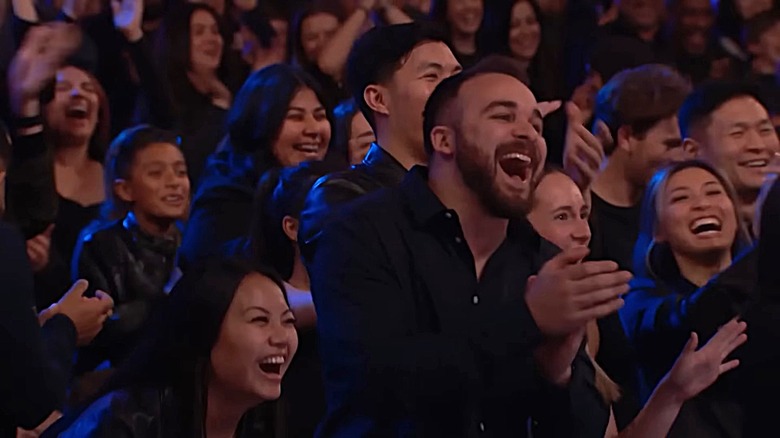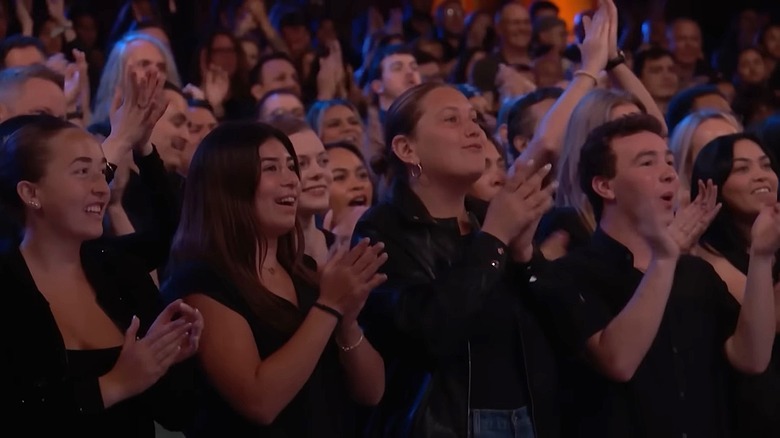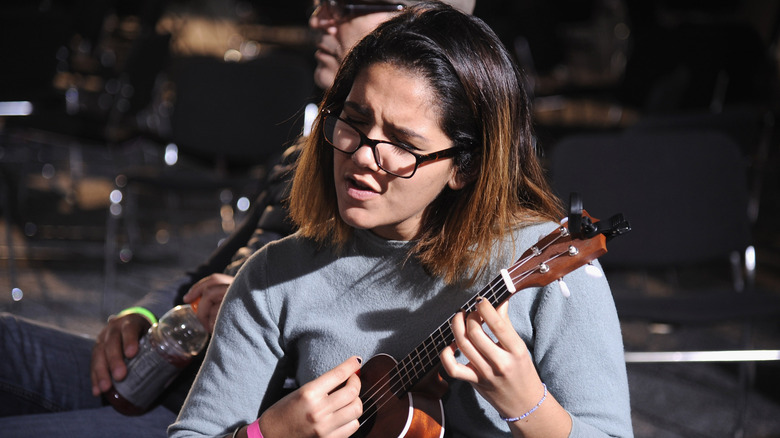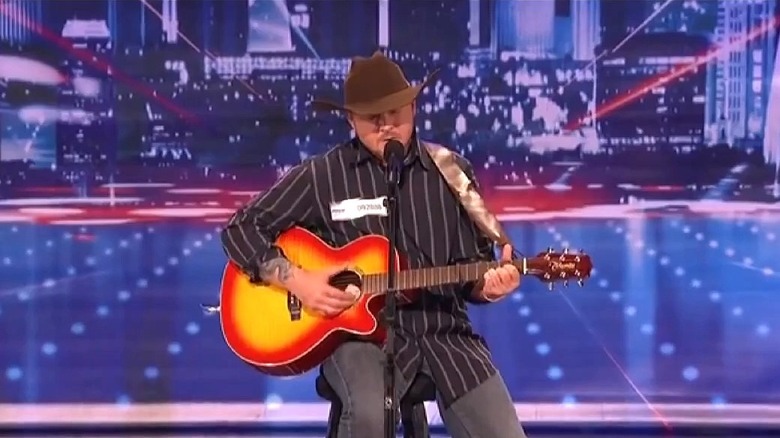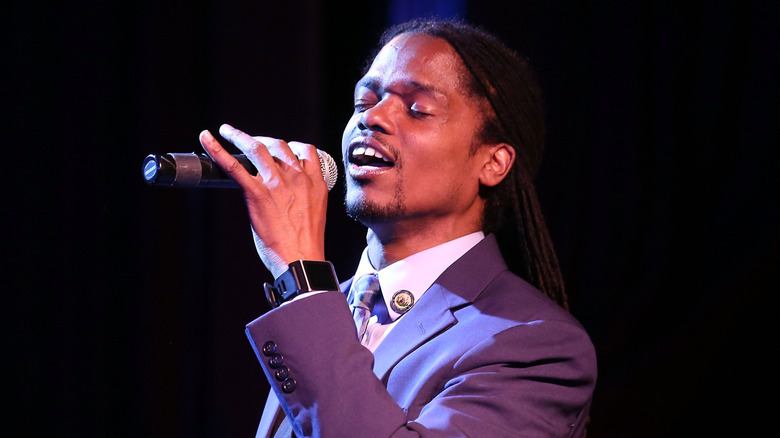Reasons America's Got Talent Is Fake
Reality competition shows hit a different kind of spot than fictional entertainment. Series like "The Voice" and "America's Got Talent" inspire and encourage viewers, leading the audience at home to believe that they, too, could showcase their unique abilities to the world one day. At the same time, they're a source of nonstop laughs as too many people overestimate their "talents" and embarrass themselves on a global stage for our amusement. That said, none of these performances prove to be dramatic enough to fall into the category of disturbing things that happened on reality shows.
The big conundrum is: How real are these reality competitions? Perhaps the better question here should be: How fake is it all? In the case of "America's Got Talent," a number of stories from previous contestants spilled out, exposing a show that's far from being entirely unscripted or unpredictable. Whether it's the producers sniffing out which contestants they want to showcase before the cameras even roll, or the participants telling the tallest tales to make their backstories more compelling for the audience, there's a lot of purported chicanery taking place to amplify the drama on television.
That isn't all, though. Other allegedly fake elements of "America's Got Talent" include the illusion that anyone and everyone can appear on the show and the notion that the esteemed judges have the final say on who goes on to the next round. So, let's dive right in and see what isn't quite what it seems about this popular reality competition series.
The people who show up for auditions have zero chance of being in front of the judges
Before each new season of "America's Got Talent," the producers hold an open call audition. Nowadays, the process is handled mostly virtually, or people submit videos via the website for consideration. In the past, there were more in-person auditions, though these events still happen on occasion today. It sounds like something of a lottery since there will be thousands — if not hundreds of thousands — of submissions from all over the country. That said, it's a golden opportunity to get on television — or is it?
According to a 2017 post made by a Redditor who claimed to have worked on the show, the in-person open call auditions lead absolutely nowhere. The user claimed they had worked at the San Antonio, Texas, leg of "America's Got Talent" one year, and a staff member from the show told them that the people who attend auditions never make it in front of the judges at all.
"There is a preliminary round that is not filmed for TV where thousands of people show up, and pretty much all the ones that make it through to the TV rounds are people that the show reaches out to themselves," the Redditor wrote. "It's mostly people they discover on YouTube. People who just show up randomly have like a 1/1,000 chance of even making it into what people viewing at home think of as the 'first round.'"
Producers work with acts to create what they want to see
Part of the allure of "America's Got Talent" is discovering the unknown acts who possess the "it" factor. It almost seems like fate as they walk up on stage and know how to captivate the audience and judges with their stellar performances. Now, it's expected there would be a certain degree of coaching for the talent beforehand, such as telling them where they should stand and which camera to face. However, a former contestant claimed that the producers are much more heavily involved than that, actively working with the talent they want to promote for that season and shaping their act.
On LiveJournal, the alleged former contestant explained that they participated in the seventh season of "America's Got Talent." Reportedly, the producer reached out to the contestant's group and offered them a spot on the show. During an hour-long conversation, the producer made suggestions about the act and what should be added since the season's focus would be "group acts" for that year. In addition to this, they worked on a storyboard of the performance and submitted a shot list to the director beforehand.
Another former contestant from 2008 claimed on Reddit that talent doesn't have much of a say on the music used. Expectedly, the producers need to clear the rights before airing songs on television; however, the contestants must accept whatever track — or remastered version — the producers decide on for their performances.
America's Got Talent producers only want incredible performers -- or terrible ones
While "America's Got Talent" presents itself as a reality competition where people have the chance to make their dreams come true, it's a television show first and foremost. This means it needs to entertain the audience and keep them invested in the program at all times; otherwise, people switch channels and watch old '90s shows we still love and watch today.
So, what measures do "America's Got Talent" producers put in place to keep viewers glued to the screen? According to a Redditor who claimed a friend of theirs attended a reality show audition, which they believed to be "America's Got Talent," there are only two standards used when selecting talent to appear in the series: great or horrible. The user said their friend was told "he was good," but since he didn't fall into either the "amazing" or "absolutely terrible" category, he failed to advance to the next round.
The user's statement makes sense when viewers consider the type of talent they see on the show. Quite often, the contestants either possess outrageous skills and abilities, or they're laughably bad and create a segment where the judges are able to rip them to shreds. The truth is, an average performer doesn't make for enthralling television or boost ratings.
Contestants sign away their rights and allow themselves to be humiliated
Reality competitions continue to be part of a trend of awful TV show formulas that won't die. A lot of people don't understand why contestants subject themselves to these televised spectacles where they often face intense bouts of scrutiny from judges and fans for daring to put themselves out there in the world. At times, the criticism borders on nasty, and one can't help but feel these individuals are being humiliated for everyone else's entertainment.
According to former contestants who described their experiences for Sean Daly and Ashley Majeski's book "Inside AGT: The Untold Stories of America's Got Talent" (via RadarOnline), everyone signs away their rights and essentially volunteers to be embarrassed when they agree to appear on "America's Got Talent." It's a Faustian type of deal where contestants don't really get a choice in the matter — they either agree to the show's set-in-stone terms and conditions for their 15 minutes of fame, or they don't appear on television at all. There is no middle ground.
A section of the book reads: "In exchange for being seen by millions of viewers each week, everyone must agree that producers can trick, exploit and embarrass them — and even depict their personal stories in a manner that 'may be factual or fictional' — and they can't sue for any reason." In other words, the show's producers control how a contestant is presented, and no one is able to contest it.
The judges don't decide who goes on – the producers do
Viewers at home watch with bated breath to see if "America's Got Talent" judges allow the contestants to finish their routines. If they make it that far, it's time for the judges to vote: Either they send them through to the next round, or they send them packing. It's a nail-biting situation that has everyone — both fans and contestants — on edge. It's also one of the most fake aspects of "America's Got Talent," according to Kayvon Zand (pictured), who appeared in Season 10.
Writing for HuffPost, Zand pulled back the curtain to show the audience what really goes on in the series. The performer described being approached by an "America's Got Talent" producer years earlier and declining; however, they finally agreed to appear on the show. Zand explained how their act wasn't televised, but they received a yes from every judge except Heidi Klum. The majority ruled, so Zand should have gone through to the next round.
"Receiving a 'yes' from the majority of the judges does not mean that you will make it to the next round," Zand wrote. "It is really up to the producers. I was told I would be notified in a couple of months. After much anticipation I was sent a generalized email explaining that I would not be sent to the next round." The performer was eventually invited to return to the Judgement Week cuts a week later.
Audience members get told how to react
"America's Got Talent" spotlights the performers and judges; however, the audience plays a critical part in building the atmosphere. Whether they boo the contestants or give them a standing ovation, they represent the viewers at home. That said, the "America's Got Talent" audience never seems to tire at these events, containing endless reserves of energy for entire seasons and reacting like clockwork to everything.
So, what's the secret to keeping the "America's Got Talent" audience so excited? Cold, hard cash, according to former audience member Kristine White. Writing for The Occidental, White revealed that the crowds are coached by the producers. White's experience transpired as follows: The audience assembled before the judges walked out. Then, a crew member came out and said: "You cannot leave your seats for the next three hours. You will be seen on camera, so DO NOT stop smiling. You will react to everything the judges say. EVERYTHING."
White explained that a staff member stated he had $250 to give away, so he would hand out $25 to random people who did what was asked of them. Then, the crowd was encouraged to cheer and laugh, pretending they were watching the contestants on stage. The stage crew filmed their reactions and coached them to go bigger, and then the show started.
Audience reactions are also heavily edited for television
There are strange rules reality TV stars have to follow, and audience members aren't exempt. Now, while the crew might tell the audience to react and behave in a certain manner, that doesn't mean everyone plays ball all the time. Much like kids in school photos, there might be that one rebel who decides to flip the bird at the camera or pull a face to be immortalized on film. It might not be obvious at first, but when the producers review the footage, they'll notice it in the background.
Apparently, "America's Got Talent" leaves nothing to chance. Not only do the producers film the crowd's reactions beforehand, but they also edit the audience heavily for the episodes, according to a Redditor who claims to have been a contestant on the show in 2011.
"If it isn't obvious enough, audience reactions on 'AGT' are heavily edited and aren't actually the true reactions to the act that's 'onstage' during the episode," the user wrote. In addition, they alleged that the crowd members in the front rows are encouraged to boo the performers on stage and try to throw them off their game.
America's Got Talent wants dramatic and sad backstories
The contestants on "America's Got Talent" don't only entertain the viewers; they also create a connection with them, often by telling their life stories. The audience's hearts melt when they hear the tale of the single mother who dreamed of a singing career but gave up her dreams to raise her child and now has a second chance at greatness. Equally, they fall in love with the performer who grinded away for 20 years, sleeping in his car and busking in the streets, and now has the chance to reach a global audience.
If it seems like most of the people on the show have tragic backstories, that's because it's entirely intentional, according to a Redditor. The user in question claimed to have auditioned for two seasons of the show and revealed how much emphasis the producers put on backstories for the performers.
The Redditor said the contestants are handed a questionnaire that contains leading questions about their past and families, prompting them to open up and talk about themselves or those close to them. In addition, the user alleged that they were asked repeatedly about any sad backstory they might have. "They kept asking me if I had a sob story," the Redditor wrote. "I mean, they really kept asking questions. Are you a single parent? Struggling financially? Homeless at ANY time in your life, etc."
Participants aren't always truthful about their backstories on America's Got Talent
Sir Elton John doesn't like reality stars, and who can blame him? Experience has taught us that a lot of them exaggerate and lie to make themselves more interesting on television. Turns out, it isn't too different on "America's Got Talent," as the producers don't appear to vet the performers' backstories to differentiate between fact and fiction.
Timothy Poe (pictured) performed a rendition of Garth Brooks' "If Tomorrow Never Comes" on "America's Got Talent" and claimed he was deployed in Afghanistan when a grenade struck and injured him. The U.S. Army disputed Poe's story, finding no record of his injury. Eventually, Poe apologized, telling WFAA: "I don't feel like I've lied. That's what's driving me crazy, because I truly thought things have happened to me."
Musician and music teacher Melissa McMahan described another instance of a contestant allegedly fabricating a backstory for the show. On her blog, McMahan revealed that she knew one of the "America's Got Talent" contestants from high school. McMahan had followed her former schoolmate's career, which included a successful stint on Broadway, so she was surprised to see how this person presented herself on the show as a teacher who wanted to take a chance with music. In fact, the person was already an accomplished professional performer.
America's Got Talent's prize money doesn't get paid out instantly
What's the reason to participate in a reality competition show, apart from appearing on television? The prizes, of course. For "America's Got Talent," the prizes offered to the winners have evolved since the show's debut in 2006. However, it's important that the contestants pay close attention to the fine print, because the devil is in the details here.
Take, for instance, "America's Got Talent" Season 6, which was won by Landau Eugene Murphy Jr. (pictured). The performer received the wonderful news he would headline a show in Las Vegas and receive a $1 million cash prize. Not bad, right?
As per Forbes, though, the small print at the end of the show indicates that "America's Got Talent" doesn't need to fork out the $1 million straight away. Instead, there's a clause that allows the show to pay out $25,000 a year for 40 years — and that's before the IRS comes knocking. Alternatively, Murphy could have accepted a gross payout in the region of $300,000. All of a sudden, that $1 million prize doesn't look as enticing as before. Contestants either have to wait a long time to get all that cheddar, or settle for less.
In the mood to read more about reality television? Check out what MTV's "Catfish" stars are doing now.
